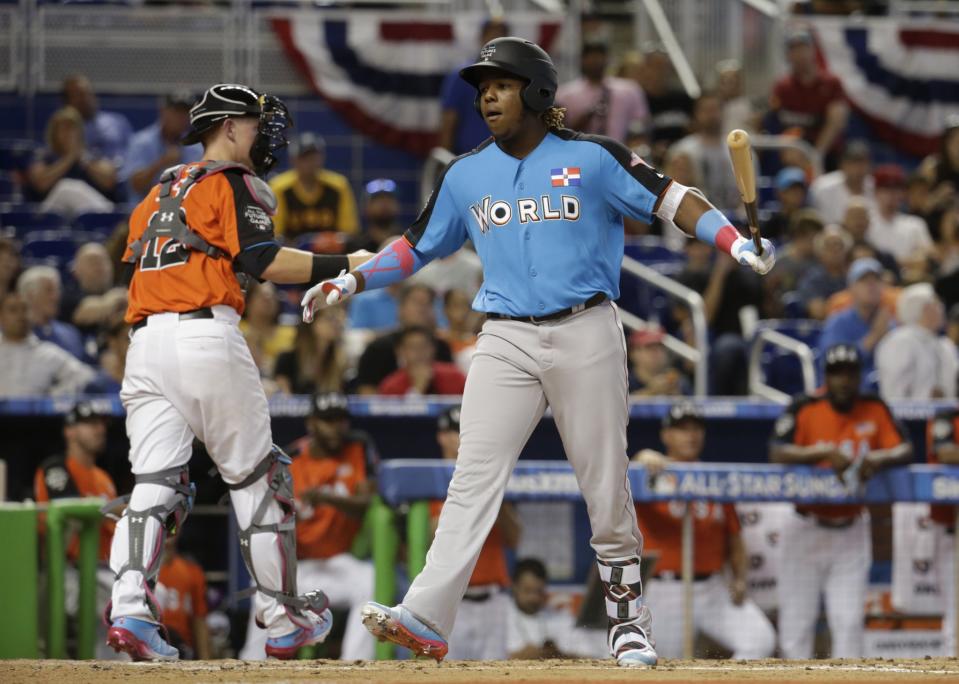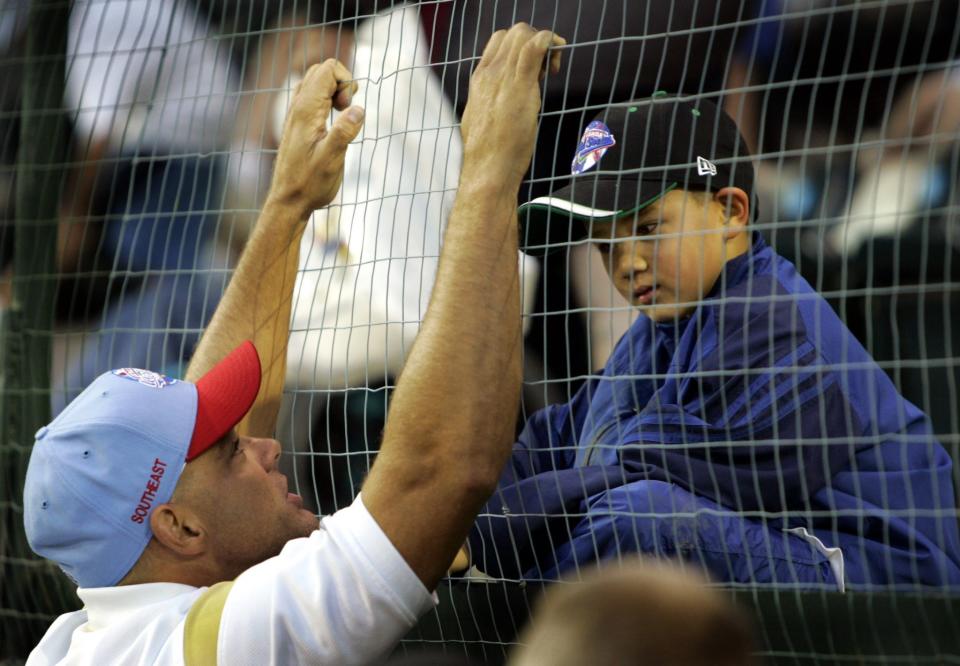Do second-generation players like Vladimir Guerrero Jr. have an advantage over the competition?
MIAMI – So Vladimir Guerrero Jr. was talking before the Futures Game that kicked off All-Star week Sunday, and off-handedly, no big deal or anything, he relayed a story that on Saturday he was hanging out with his father, the future Hall of Famer Vladimir Guerrero, and Pedro Martinez, already enshrined in the Hall. And it seemed reasonable to wonder just how well Vlad Jr., just 18 years old and already one of the best prospects in baseball, knew his dad’s teammate on the greatest team that never was.
“He’s my godfather,” Vlad Jr. said.
I remember when I took my son to see me play in the All Star Game. Today, he will play in the Futures Game. Thanks God for the blessings! pic.twitter.com/FwtNO79S8n
— Vladimir Guerrero (@VladGuerrero27) July 9, 2017
For a game as big as baseball, a $10 billion-a-year behemoth, a spectacle that puts 75 million butts in seats every year, it can feel shockingly small for those inhabiting it. Vlad Jr.’s teammate this season and opponent at the Futures Game, Bo Bichette, is the son of former big leaguer Dante Bichette. They play for the Toronto Blue Jays organization, the longtime team of Paul Quantrill, whose son Cal pitched for the World team on Sunday. Cal grew up jetting from city to city on planes with other sons of ballplayers, like Nick Gordon, scion of longtime reliever Tom “Flash” Gordon and the leadoff hitter and shortstop Sunday for the United States.
Add in Jonathan Hernandez, whose father made two appearances in the big leagues, and five of the 50 players on the Futures Game rosters were the sons of major leaguers. The first four are near-guarantees to join the club of more than 200 second-generation major leagues, around 15 to 20 of whom populate the game at any given time today. Michael Brantley and Lance McCullers Jr. are All-Stars this year. Travis Shaw easily could’ve been.

“I think it’s a mixture of nurture and nature,” Quantrill said. “I’m not denying that having a dad who played in the big leagues is valuable. You tend to be a bigger guy. You’re probably going to be athletic. That being said, if you look around this locker room, there are a lot of guys bigger than me, a lot of guys stronger than me, who come from families that did not have a professional baseball player.
“And then there’s the nurture side. At 2 years old, I had a pitching coach. At 6 years old, I had a pitching coach. At 10 years old, I had a pitching coach. And it wasn’t a regular guy giving back to the community. I had a big leaguer as a pitching coach. We can debate if it’s 60-40 or 50-50, but a combination of those things is nothing but an advantage.”
Add in the socioeconomic element, and the advantage is palpable. Youth baseball is perilously expensive, particularly for those in the United States whose summers are spent playing on travel teams and gearing up with gloves and bats that run $350 a pop. Dante Bichette earned more than $40 million in his career and Tom Gordon more than $50 million, and though their ability to fund their sons’ livelihoods sustained them, the additional support supplied further enhancement.
“From a young age,” Bo Bichette said, “we learn a lot about what it takes to be a big league ballplayer.”
“I definitely have had an advantage,” Nick Gordon said. “My dad is a genius, man. Just don’t tell him I said that.”
In 2005, Gordon was a 9-year-old who would whiz fastballs back and forth with an 11-year-old son of another New York Yankees player: Mariano Rivera Jr. Cal Quantrill, 10 at the time, would sit in the corner of the room. “They threw too hard,” he said. Quantrill and Gordon bonded via PlayStation Portable, opposing one another in MLB’s game on the console. Quantrill met dozens of kids, probably more, during his father’s 14-year career as a relief pitcher.
“Wouldn’t surprise me if I met Vladimir Guerrero Jr., either,” he said.
Guerrero was the youngest player at the Futures Game on Sunday, and he whacked a single into left-center field in the World team’s 7-6 loss to the U.S. He has rocketed toward the top of prospect lists this season after spending most of his childhood in the Dominican Republic, like Hernandez, who signed with the Rangers as a 16-year-old. Guerrero’s life, in particular, was unique, as he lived in an impoverished country with the wealth of a prince.

Vlad Jr. carries himself with a knowing gait. He doesn’t walk; he swaggers. On top of his head is a mess of blond-dyed dreadlocks. He smiled plenty before the game and during it and answered questions as plenty of 18-year-olds not used to answering questions would. He and Bichette, 19, are headed to High-A Dunedin after the game, a promotion that brings them one step closer to the big leagues.
The whole thing made Omar Minaya laugh. He was the general manager of Montreal in 2003, when Vladimir Guerrero played his last game for the Expos. Vlad Jr. was 4 at the time. Minaya didn’t think a whole lot of the pudgy kid until about a decade later, when he was working for the San Diego Padres.
“Here he is,” Minaya said. He pulled out his phone and flipped to a picture. On the left, Vladimir Guerrero. In the center, Minaya. On the right, Vlad Jr., in a Padres uniform. “This is me, him and Vladdy the year before he signed.”
Minaya left the Padres in January 2015 to join the Major League Baseball Players Association, and he wonders how different things may have been for the Padres and Blue Jays had Guerrero not signed with Toronto for $3.9 million. He understands that it’s baseball, that guys come and guys go, that a familiar name from one generation may crop up the next, that the bloodline won’t be drying up anytime soon.


